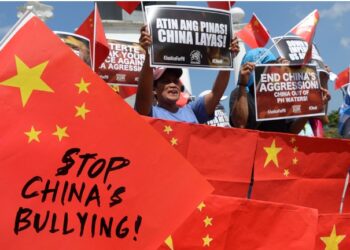Dave Walsh, a renowned energy expert and former Trump energy advisor, appeared on the WarRoom on Monday and expressed critical views on the Inflation Reduction Act (IRA) and its unintended consequences, particularly concerning China’s benefits.
He argues that while the IRA is designed to address climate change and reduce inflation by investing in clean energy, it inadvertently enriches China and potentially the Chinese Communist Party (CCP).
The Inflation Reduction Act, signed into law by Democrat Joe Biden in August 2022, is a comprehensive $369 billion package to address climate change, lower healthcare costs, and reduce the federal deficit. The Act focuses on substantial investments in “clean energy”, including wind, solar, and electric vehicle (EV) technologies, to transition the U.S. economy to a greener, more sustainable model.
This issue is urgent for voters to grasp and understand.
How the IRA Indirectly Benefits China
1. Dependency on Chinese Supply Chains
A significant portion of the IRA’s investments is allocated to renewable energy technologies that heavily rely on Chinese supply chains. China dominates the global production of critical materials and components essential for clean energy technologies, such as lithium, cobalt, nickel, and rare earth elements. These materials are vital for manufacturing batteries, solar panels, and wind turbines.
Lithium and Battery Production:
China is the largest producer of lithium-ion batteries, controlling nearly 80% of the global supply chain. The IRA’s incentives for electric vehicles and energy storage significantly boost demand for these batteries, indirectly increasing U.S. reliance on Chinese-produced lithium and battery technology.
Solar Panels:
China’s dominance in solar panel production is profound, with the country producing over 70% of the world’s solar panels. The IRA’s support for solar energy projects directly benefits Chinese manufacturers, who are poised to supply the increasing demand in the U.S. market.
Rare Earth Elements:
Rare earth elements are crucial for many green technologies, including wind turbines and electric vehicles. China controls about 85% of the global supply, creating a bottleneck that the IRA inadvertently feeds into.
2. Financial Gains for Chinese Companies
The IRA encourages the adoption of technologies where Chinese companies are major players, leading to significant financial gains for these entities. The increased U.S. investment in green technologies translates to higher revenues for Chinese firms supplying these critical components and technologies.
Economic Influence:
By bolstering demand for Chinese-made products, the IRA indirectly strengthens China’s economy and enhances its geopolitical influence. This economic leverage can be seen as a strategic advantage for the Chinese Communist Party, which benefits from increased revenue streams and global market dominance.
3. Strategic Leverage for the Chinese Communist Party
Walsh suggests that the CCP could potentially exploit this dependency to exert strategic pressure on the United States. China’s control over key materials and components gives it significant leverage in negotiations and trade dynamics, allowing it to influence global markets and political decisions.
Concerns Over Environmental and Ethical Issues
Walsh also raises concerns about the environmental and ethical implications of sourcing materials from China. The mining and production processes for many of these critical materials often involve environmentally damaging practices and exploitative labor conditions. For instance:
Environmental Degradation:
The extraction and processing of lithium and rare earth elements in China have been associated with severe environmental damage, including water pollution and habitat destruction.
Labor Exploitation:
Reports of forced labor and poor working conditions in Chinese mines and factories further complicate the ethical dimensions of sourcing these materials.
Potential Alternatives and Solutions
To mitigate these challenges, Walsh advocates for developing domestic supply chains and investing in alternative sources of critical materials. By encouraging local production and fostering international partnerships with countries that have more ethical and environmentally friendly practices, the U.S. can reduce its reliance on China and create a more sustainable and secure energy future.
Domestic Investments:
Increasing investments in American mining and manufacturing of critical materials could help build a more resilient and independent supply chain. The U.S. possesses significant untapped reserves of lithium and rare earth elements, which could be developed to meet domestic demand.
International Collaboration:
Walsh said that Collaborating with allied nations to diversify sources of critical materials can reduce the geopolitical risks associated with reliance on China. Countries like Australia and Canada have substantial reserves of these materials and offer more stable and ethical sourcing options.
While the Inflation Reduction Act aims to address crucial environmental and economic issues, Walsh highlights significant concerns about its indirect benefits to China. By deepening U.S. reliance on Chinese supply chains and technologies, the Act potentially enriches China and the Chinese Communist Party, posing strategic and ethical challenges. To address these issues, a concerted effort to develop domestic capabilities and diversify international partnerships is essential for ensuring a sustainable and secure energy future.
For more context, watch the full segment with Dave Walsh:
Walsh: America Experiencing Demand Driven Economic Stagnation And Now Decline





![Bannon’s WarRoom, Show Clip Roundup 8/5/2024 [PM]](https://warroom.org/wp-content/uploads/2024/08/BN-SL616_0313BA_E_20170313152810-75x75.jpg)